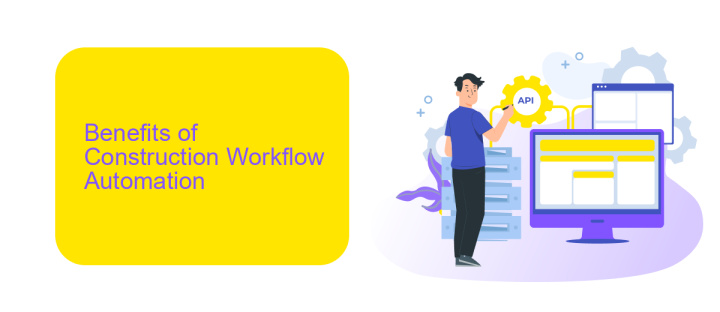Construction Workflow Automation
In today's rapidly evolving construction industry, efficiency and precision are paramount. Construction workflow automation streamlines processes, reduces human error, and enhances productivity. By leveraging advanced technologies and software solutions, construction firms can optimize project management, improve communication, and ensure timely project completion. This article delves into the transformative impact of automation on construction workflows, highlighting key benefits and practical applications.
Introduction
In the fast-paced world of construction, efficiency and precision are paramount. Automating construction workflows can significantly reduce manual errors, save time, and enhance overall productivity. By leveraging advanced technologies and software solutions, construction companies can streamline their operations and focus on delivering high-quality projects on time and within budget.
- Improved project management through real-time data tracking.
- Enhanced collaboration among team members and stakeholders.
- Reduced operational costs by minimizing manual interventions.
- Increased accuracy in project timelines and resource allocation.
- Seamless integration with existing tools and systems.
One of the key components of successful construction workflow automation is the integration of various tools and services. Platforms like ApiX-Drive facilitate this process by enabling seamless data transfer between different applications, ensuring that all systems work in harmony. By automating routine tasks and synchronizing data across platforms, construction companies can achieve greater operational efficiency and focus on strategic initiatives.
Benefits of Construction Workflow Automation

Construction workflow automation offers numerous benefits, significantly enhancing efficiency and productivity. By automating repetitive tasks, such as scheduling, document management, and progress tracking, construction teams can focus on more critical activities that require human expertise. This leads to faster project completion times and reduced errors, as automated systems ensure consistency and accuracy in task execution. Additionally, automation provides real-time updates and insights, enabling better decision-making and proactive problem-solving.
Integration of various tools and services is another key advantage of construction workflow automation. Platforms like ApiX-Drive facilitate seamless integration between different software used in construction projects, such as project management tools, CRM systems, and communication platforms. This interconnectedness ensures that data flows smoothly across all systems, eliminating the need for manual data entry and reducing the risk of discrepancies. Consequently, teams can enjoy a more streamlined and cohesive workflow, ultimately leading to improved project outcomes and higher client satisfaction.
Types of Construction Workflow Automation

Construction workflow automation encompasses a variety of technologies and methodologies designed to streamline processes, enhance efficiency, and reduce errors in construction projects. By automating repetitive tasks, construction firms can focus more on strategic planning and execution.
- Document Management Automation: Automates the handling, storage, and retrieval of documents, reducing manual paperwork and ensuring better compliance and traceability.
- Project Scheduling Automation: Utilizes software to automatically schedule tasks, allocate resources, and track project timelines, ensuring timely completion and optimal resource utilization.
- Integration Automation: Tools like ApiX-Drive facilitate the seamless integration of various construction software and applications, ensuring data consistency and real-time updates across platforms.
- Quality Control Automation: Implements automated checks and inspections to ensure that construction standards and regulations are consistently met throughout the project lifecycle.
By leveraging these types of construction workflow automation, companies can significantly enhance their operational efficiency, reduce costs, and improve project outcomes. Embracing automation not only modernizes the construction process but also provides a competitive edge in a rapidly evolving industry.
Implementation Considerations

When implementing construction workflow automation, it's crucial to consider several key factors to ensure a smooth transition and effective operation. Firstly, assess your current workflow to identify repetitive tasks that can be automated, as well as areas that require human intervention.
Next, evaluate the compatibility of your existing software and tools with the new automation system. Ensure that the chosen solution can seamlessly integrate with your current infrastructure to avoid disruptions and additional costs.
- Identify specific tasks and processes that can be automated.
- Ensure compatibility with existing software and tools.
- Plan for training and support for your team.
- Consider data security and compliance requirements.
For integrating various software and tools, services like ApiX-Drive can be highly beneficial. ApiX-Drive simplifies the process of connecting different applications, allowing for streamlined data flow and reducing manual data entry. By carefully planning and considering these factors, you can effectively implement construction workflow automation to enhance productivity and efficiency.
Conclusion
In conclusion, the automation of construction workflows represents a significant advancement in the efficiency and productivity of the industry. By leveraging modern technologies and integrating various tools, companies can streamline their operations, reduce manual errors, and enhance overall project management. This transformation not only saves time and resources but also allows for better collaboration and communication among team members.
Utilizing services like ApiX-Drive can further optimize these processes by enabling seamless integration between different software applications. ApiX-Drive simplifies the setup of integrations, ensuring that data flows smoothly across platforms without the need for extensive coding or technical expertise. Ultimately, embracing workflow automation and effective integration tools equips construction firms with the agility and precision needed to meet the demands of today's fast-paced environment.
- Automate the work of an online store or landing
- Empower through integration
- Don't spend money on programmers and integrators
- Save time by automating routine tasks
FAQ
What is Construction Workflow Automation?
How can Construction Workflow Automation benefit my construction projects?
What types of tasks can be automated in construction workflows?
How do I get started with automating my construction workflows?
What should I consider when choosing an automation platform for construction workflows?
Apix-Drive will help optimize business processes, save you from a lot of routine tasks and unnecessary costs for automation, attracting additional specialists. Try setting up a free test connection with ApiX-Drive and see for yourself. Now you have to think about where to invest the freed time and money!


